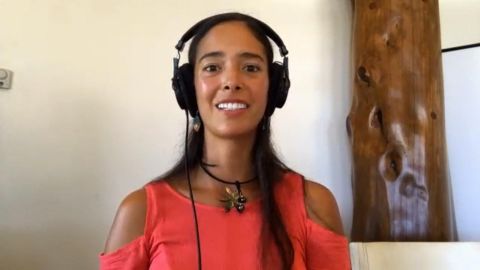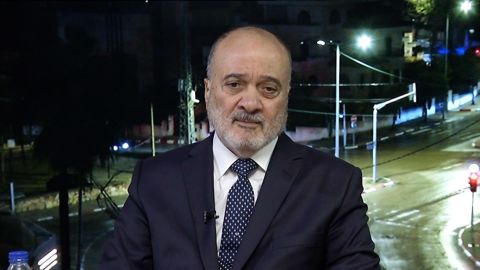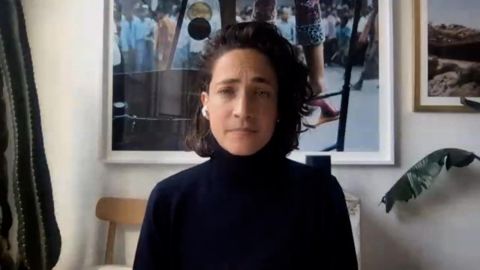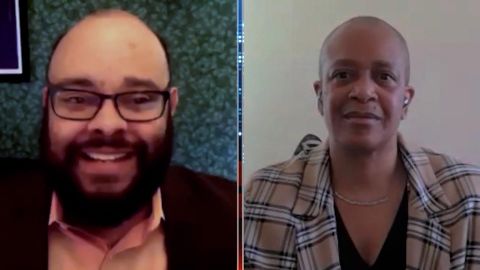Read Transcript EXPAND
CHRISTIANE AMANPOUR: Now, the trial of Derek Chauvin, the Minneapolis officer charged with killing George Floyd, is set to begin on Monday. Our next guests delve into the challenges with policing as America grapples with institutional reform. Phillip Atiba Goff is one of the country’s leading scholars on law enforcement and race. And Tracie Keesee is a former Captain with the Denver Police Department. They cofounded the Center for Policing Equity, and here they are talking with our Michel Martin about strengthening relations, relationships with the communities they serve.
MICHEL MARTIN: Thanks, Christiane. Tracie Keesee, thank you so much for joining us.
TRACIE KEESEE, CO-FOUNDER, CENTER FOR POLICING EQUITY: Thank you for inviting me.
MARTIN: Phillip Atiba Goff, thank you so much for joining us.
PHILLIP ATIBA GOFF, PSYCHOLOGIST, CO-FOUNDER, CENTER FOR POLICING EQUITY: Thanks for having us.
MARTIN: Dr. Keesee, I want to point out that you’re a 25-year police veteran in addition to your academic work. You retired as a Captain of the Denver Police Department, and I do need to know that a police officer was killed as he went to respond to what became a mass casualty event in a super market in Boulder. What does this moment bring up for you?
KEESEE: It brings up a lot of things. First, it brings up the emotions and the feelings of when you lose an officer in the line of duty, the devastation that it brings not only to the community in which he served, but to his family and the seven children that are left behind. To look at what’s happening in these last couple of, you know, days tells you just how complex the situations are that we are really truly dealing with when we talk about policing, when we talk about public safety and law enforcement. It is exactly what we talk about when we have — you had an officer who ran towards danger as he was trained to take his — you know, lose his life, and then on the other conversation to have — a conversation around how officers are treating black communities and other communities of color.
MARTIN: There are just so many threads in American life are colliding at this point that speak to your work. I mean, the officer who has been charged in connection with the death of George Floyd, that trial is about to begin. The anniversary of the death of Breonna Taylor, her family has just reached a significant settlement with the City of Louisville. Another set of trials that’s going forward or charges that are going forward are connected to the mob attack on the U.S. capitol back in January. And one of the disturbing things that has emerged is a disproportionate number of those currently charged either have ties to the military or ties to law enforcement. What’s that about?
KEESEE: It’s not new. I can tell you that’s what that’s about. The issue of white supremacy in the military and policing is not a new issue. What’s new is the fact that the light really now has been shown on it and people have to respond. So, the question that a lot of us have, not just, you know, retired officers or current officers, I’m sure the military the same way is, what do you do? How do you begin to address those issues and those folks that are inside these organizations and then how do you screen so you don’t continue to bring them in? And so, again, it’s not new. But it also really does add to what communities across this country have been seeing in the way in which they have been treated, in the way in which they are being approached about their own public safety. I can tell you a lot of my law enforcement colleagues who were very much about previous administration and being pro law enforcement, we’re at a loss for words, when you have a group of people that you continue to claim support law enforcement and yet you take the life of law enforcement. So, I think that we really have to — we have that conversation about, what did we really see on that morning? And what we saw was white supremacy on display and folks really not wanting to deal with the outcomes of that.
MARTIN: Is it your sense that some people are attracted to this work because they see it as upholding the authority of a certain group of people over other people? I think some people — I would hope that some people now know the history of, say, the Ku Klux Klan infiltration of police agencies, for example, or sort of an overlap between people who actually belong to white terrorist groups in their off time and then, you know, belong to law enforcement agencies and — but I think a lot of people think that that’s of the past. I mean, I’m sure some people think, well, that’s not — that’s back then, but that’s not now.
KEESEE: No. And I would say there may be some who that feel that way. But if you really want to ask what’s going on inside the organization and the feel of what is happening when we talk about white supremacy, ask officers of color. We, on a daily basis, have conversations with black officers from across this country who will tell you they are (INAUDIBLE) experiencing it, they are navigating it, they are managing it, they’re trying to get to retirement because of it. And so, when you ask who is really thinking about, you know, who is attracted to this particular profession, you have a lot of thousands of officers who want to serve, who really want to do the right thing. And you have some that are attracted to it for all of the wrong reasons. And part of the conversation that we’re having and we continue to have is the stools that are used to screen people in and screen people out. And what we find, you know, even as we look across this country, you can look at processes for people trying to join the police department and you can tell who is going to be screened out before they get a chance to go into the economy. It’s typically black men and it’s typically women of color. And so, one of the interesting conversations that’s really happening around this, right, and I think this is from the new administration is to invest millions of dollars into recruiting so police organizations can reflect their community. What is sort of tone deaf about that is not asking about the experiences of black officers and women in policing to know whether or not that is the way you want to go. You can certainly invest millions of dollars spent in recruiting across this country, but once folks get in, it’s completely different than what they were told it was going to be. And unless you deal with the culture of policing, you’re not going to retain people.
MARTIN: I’d love to hear more about the culture piece. Maybe, Dr. Goff, you want to pick it up here? I’m sure some people are listening to our conversation and they’re feeling, well, gosh. I mean, that’s a hard job, as evidence by the fact that a man was just killed for doing it, right? So, I think some people would say, well, why would you do that job if you were a bad person, if you wanted to hurt people? People who do that job are people who want to help people. How can bad things happen if good people who want to help people are doing that job?
ATIBA GOFF: You do have people who want to dot right thing for a living, show up at the door and say, I’m ready to serve. That’s a powerful statement, I’m ready to serve, and they mean that. And they’re trained to put themselves between danger and the rest of their community. We can’t let go of that and forget that as if that doesn’t happen. It just happens. I want to bring his name, Officer Goodman, who was a hero on January 6, where everybody said, look at this black man saving all of Congress. That is a sworn officer, right. It’s a sworn officer who was called a traitor by the people on the steps of the capitol. It’s not just about who shows up and does law enforcement, it’s also what we allow, what we require law enforcement to do as a residence of communities, right? Law enforcement didn’t just show up in Central Park, they were called. Law enforcement didn’t decide that they wanted to be the first responders to substance abuse and mental health and homelessness, we decided we were going to take money out of the social services that serve those communities and we were going to send law enforcement instead. Think about that just for a second. As a country, community by community, city by city, state by state, we decided instead of having services for folks who are having the worst time of their lives, we were only going to have that support them, services that help them to get better, we were only going to have services whose job was, whose mission was to determine the need for punishment. So, on two levels, we’ve got to get the right people into the job, but we have to decide what the job should be. Because if the job is only going to be wherever there are black and brown people struggling, I want to send badges and guns. I want to send people whose job it is to determine should we take away liberty, should we take away life? If that’s our decision, don’t blame law enforcement officers or law enforcement executives for the fact that that’s what happens when they show up, blame us because we kept deciding that that was the mission of law enforcement. So, that double duty, getting the right people in, but deciding the right mission for those people, that’s what countries across the country are freaking out. If we want to straighten the size, the footprint of the way that we punish, what could public safety look like? And the reason you’re hearing people say reimagine is because often we’re stuck in the trap that either you have to have cops or you have to have lawlessness as if there is no other way to put a society together.
MARTIN: Now, talk about that. I mean, because you’ve mentioned a number of jurisdictions as a way to reimagine the way policing is done, the way justice is done, have elected say reformist prosecutors. And that’s important because, you know, prosecutors determine, you know, what cases will be brought and how those cases will be disposed of. Presumably they’re going to change the incentive for the behavior on the — that’s happening on the streets. But what we’ve seen in a number of these jurisdictions is a furious reaction to these reformist moves, even though these are people who are elected, you know, by the people. Well, what do you make of that? Like what does that say?
ATIBA GOFF: I think it’s really clear that there are some forms of power that are being threatened in a way they don’t like, right. And I want to be also clear this, too, is not new. Whenever folks came by and said, the power that shapes the United States into a white supremacist society is going to be challenged. White supremacy said, hey, you might have forgotten about us. We’re still here. That’s where violence happens, mass violence, where threats happen, where the FBI is mobilized against the notion of just black liberation. If you think about sort of a simpler version of it, not just the prosecutor, but the battle cry that sort of cohered this moment in the long struggle for black emancipation and liberty, black lives matter. How anodyne a statement is that? Black lives are nifty. Black lives are not to be degraded, to be, you know, discarded. That has led to folks calling for further prosecution, to new federal penalties for black identity extremists. When power is threatened, this is what you see. And the power in the United States is not just corporate power, though it’s also that. It’s not just elected power, though it’s also that. It’s also the power of white racial politics, and it is being threatened now more directly than we’ve seen in over the past several decades.
MARTIN: Dr. Keesee, what are your thoughts about this? Do you see an appetite in these departments for — well, what do you see as a person who has done that job, who has been on the street, who has been in patrol cars, who has been on, you know, patrol and who works with people, you know, throughout your career and now, of course, has a look at it from a research perspective? What do you see?
KEESEE: As we look at the work that’s going on across the country, what you see are communities exercising their power where historically, it has been sort of counted on that they weren’t paying attention or they were just good with it. What is interesting about that power and what we see in the conversations that we’re having with our chiefs. We have a lot of chiefs that really want to make sure that they are providing the right type of service for the community. I want to say that just flat-out. They want to see it. Where you find a lot of the struggle happening is understanding how that should happen and what does it look like. There is a tremendous amount of concern in regards to as, you know, we’ve all been talking about, what do we do and how do we sort of help get through this sort of spikes in violent crime? How do we make sure that victims need services get those services? And so, we’re really trying to manage that piece. That’s in addition to how do those service really, in an equitable sense, get even sort of parsed out? So, if you have folks that have mental health issues, and you’ll hear this in law enforcement, there isn’t a chief that will tell you, we should be the number of folks answering those calls with people with mental health crises. They just won’t. But what they will tell you is there are some of those calls as well where you have folks who have not been on their meds, that may be violent, how do we help protect those workers who are going in, who we believe are the right people to be going in? So, you hear those really healthy conversations happening.
MARTIN: I’m thinking about that — the case and another case from Colorado, Elijah McClain in Aurora, Colorado. And he’s walking along the street, going home, he’s tackled by police of no reason that anybody can determine, really. He’s injected with a powerful sedative, and he dies. And how do we think about something like this? I mean, what needs to change so that something like this does not happen again?
KEESEE: There was a lot of work done after Elijah McClain’s death. They did an incredible — I don’t know if you’ve seen it, they did an incredible review of the entire process to even say that the stop was not legal, but what he needed was a mental health service. Even, you know, as you go on these calls like most of us have and you walk into these spaces and you yourself are saying, I’m not what these people need. I’m not what they need, but all I have is this. So, if there is something in there that may be able to provide some level of comfort or provide some level of service, then if I can, I will. The number one thing we’re really around some of the pushback on the reimagining work is, well, if you get rid of — you know, first, the narrative is, well, you’re going to get rid of all the armed officers. That’s not it. It is really reduce that footprint to have the officers doing exactly what they say they want to do and that’s crime. When we do the analysis on 911 calls, you know what at least 2 to 4 percent of those calls are violent crime, the rest are social service calls. That tells you that we’re out of alignment here about what we should be doing and providing this community.
MARTIN: Another sort of issue that has emerged in recent weeks, even though it’s clearly been going on for quite some time, is the rise in assaults on people of Asian descent. And I’d like to ask you, how do you think we should think about this? Because you’re already seeing the conservative media a desire to move the focus to black on Asian crime, that is happening. That is a thing that is happening. We’re seeing a focused — a renewed focus on, again, this notion that defunding the police is the cause of this spike in assaults. OK. How do you think we should think about this? How should we be talking about this?
ATIBA GOFF: Yes. So, I think part of the reason why it’s confusing in the space that we are right now is because we’ve been so dishonest about our history, right. When you have folks at the bottom of the social hierarchy fighting with each other, it’s really easy to take the camel in and focus in on them and say, why do they hate each other so much, and not zoom out and say, it’s in part because they’ve been given so few resources. There are other people who are benefiting from this, right. So, part of the way that we should be thinking about this is that you’ve got immigrant communities with — you know, born in the United States or native to the United States communities that are put in terrible positions of vulnerability, economic vulnerability and a lack of social power. So, that creates tension because ain’t nobody got enough in those communities. Those tensions become racialized in the service of folks who are extracting all of the resources out of those communities in the first place. If we had a broader lens, a broader understanding of who is benefiting and who is actually suffering, we would blame the folks who have very little far less than we do. The other piece of this is that we tend to frame conflict in the United States around race as if only black people and white people exist, as if not that contest, that sin of slavery, we call it the original sin, but how do you have stolen people doing all this labor unless you also have land that’s been stolen, right? So, the genocide for native and brothers and sisters, we have to acknowledge that, and the imported indentured servitude that Chinese laborers got to do when they were forces to build railroads also an incredible backbreaking disgusting racialized form of violence that helped build the capital resources of the country. So, when we frame racism as if it’s a white thing happening to black people and we don’t frame it as part of this larger project of extraction of resources from black folks and brown folks and red folks, right, from Asian folks and native folks, everybody, right, if we don’t frame it that way, then it’s easy to think that the problem is between whoever we catch on camera in that moment.
MARTIN: I wanted to ask what you think the Biden administration should be doing right now.
KEESEE: So, one of the things we want to make sure is happening, especially with this new administration, and there is an understanding that policing is really local. We have violence interrupters throughout this country who have stepped in in communities and have done things that police could not do. You have to invest in that work that is happening, and there seems to be, for some reason, a reason not to want to do that. To want to put it in some kind of structure that feels acceptable other than what may work and doesn’t look like the way we think it should. And there are a lot of things that believe in the George Floyd act that will be helpful. For us, we always talk about data collection. In some of that work, there’s conversation about collecting data for us. We collect everything. Do not sort of restrict. Be very clear. And we have, you know, a lot of things on our website that helps guide those things where you can figure out what should everybody be collecting so we truly can begin to look at what we need to do and to supplement the work that is happening on the ground.
ATIBA GOFF: The thing that I want folks to be able to do, as you’ve been hearing bits and pieces of, I want us to gain the kind of historical literacy with consequences. There are things that we have done in this country to accumulate wealth and power in incredibly concentrated ways, and it’s always been on the backs of immigrants and darker-skin folks, right. That is not known, not as widely as it needs to be. It is not acknowledged and we don’t act on it. So, if we don’t have a full accounting of the ways in which this country has benefited from our terrible treatment of vulnerable folks, there’s no way to build the structures that prevent that exploitation going forward, including policing.
MARTIN: Tracie Keesee, Phillip Atiba Goff, thank you both so much for speaking with us today and sharing your expertise.
ATIBA GOFF: Thank you, Michel.
KEESEE: Thank you so much, Michel.
About This Episode EXPAND
Paola Ramos; Nasser al-Kidwa; Phillip Atiba Goff; Tracie Kessee; Mahani Teave
LEARN MORE



